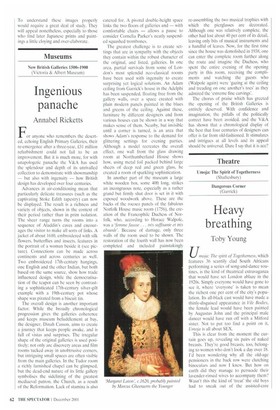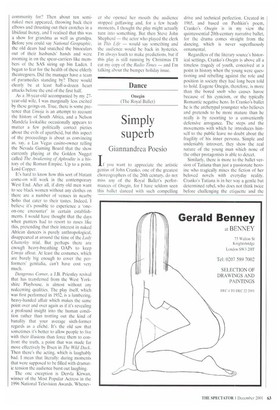Umoja: The Spirit of Togetherness (Shaftesbury) Dangerous Corner (Garrick)
Heavy breathing
Toby Young
Umop: The spirit of Togetherness, which features 36 scantily clad South Africans performing a series of song-and-dance routines, is the kind of theatrical extravaganza that would have set London ablaze in the 1920s. Simply everyone would have gone to see it, where 'everyone' is taken to mean the richest one per cent of the city's population. Its all-black cast would have made a thinly-disguised appearance in Vile Bodies, the female lead would have been painted by Augustus John and the principal male dancer would have run off with a Mitford sister. Not to put too find a point on it, Urnoja is all about SEX.
This is clear from the moment the curtain goes up, revealing six pairs of naked breasts. They're good breasts, too, belonging to women who don't look a day over 18. I'd been wondering why all the old-age pensioners in the back row were clutching binoculars and now 1 knew. But how on earth did they manage to persuade their lavender-rinsed wives to accompany them? Wasn't this the kind of 'treat' the old boys had to sneak out of the assisted-care
community for? Then about ten seminaked men appeared, throwing back their elbows and thrusting out their crotches in a libidinal frenzy, and I realised that this was a show for grandma as well as grandpa. Before you could say National Geographic. the old dears had snatched the binoculars out of their husbands' hands and were zooming in on the spear-carriers like members of the SAS sizing up bin Laden. I began to fear for the health of these elderly theatregoers. Did the manager have a team of paramedics standing by? There would clearly be at least half-a-dozen heart attacks before the end of the first half.
As a 38-year-old accompanied by my 27year-old wife, I was marginally less excited by these goings on. True, there is some pretence that Urnoja is an attempt to recount the history of South Africa, and a Nelson Mandela lookalike occasionally appears to mutter a few politically correct pieties about the evils of apartheid, but this aspect of the proceedings is about as convincing as. say, a Las Vegas casino-owner telling the Nevada Gaming Board that the show currently playing at the Golden Nugget called The Awakening of Aphrodite is a history of the Roman Empire. Up to a point, Lord Copper.
It's hard to know how this sort of blatant come-on will work in the contemporary West End. After all, if dirty old men want to see black women without any clothes on there are a number of venues in nearby Soho that cater to their tastes. Indeed, I believe it's possible to experience a 'oneon-one encounter' in certain establishments. I would have thought that the days when punters had to resort to ruses like this, pretending that their interest in naked African dancers is purely anthropological, disappeared at around the time of the Lady Chatterley trial. But perhaps there are enough heavy-breathing OAPs to keep Umoja afloat. At least the costumes, which are barely big enough to cover the performers' genitalia, can't have cost very much.
Dangerous Corner, a IR Priestley revival that has transferred from the West Yorkshire Playhouse, is almost without any redeeming qualities. The play itself, which was first performed in 1932, is a lumbering, heavy-handed affair which makes the same point over and over again as if it's revealing a profound insight into the human condition rather than trotting out the kind of banality that your average sixth-former regards as a cliche. It's the old saw that sometimes it's better to allow people to live with their illusions than force them to confront the truth, a point that was made far more effectively by Ibsen in The Wild Duck. Then there's the acting, which is laughably bad. I mean that literally: during moments that were supposed to be filled with dramatic tension the audience burst out laughing.
The one exception is Dervla Kirwan, winner of the Most Popular Actress in the 1996 National Television Awards. Whenev er she opened her mouth the audience stopped guffawing and, for a few heady moments. I thought the play might actually turn into something. But then Steve John Shepherd — the actor who played the clerk in This Life — would say something and the audience would be back in hysterics. I'm always loath to make predictions, but if this play is still running by Christmas I'll eat my copy of the Radio Times — and I'm talking about the bumper holiday issue.





















































































 Previous page
Previous page